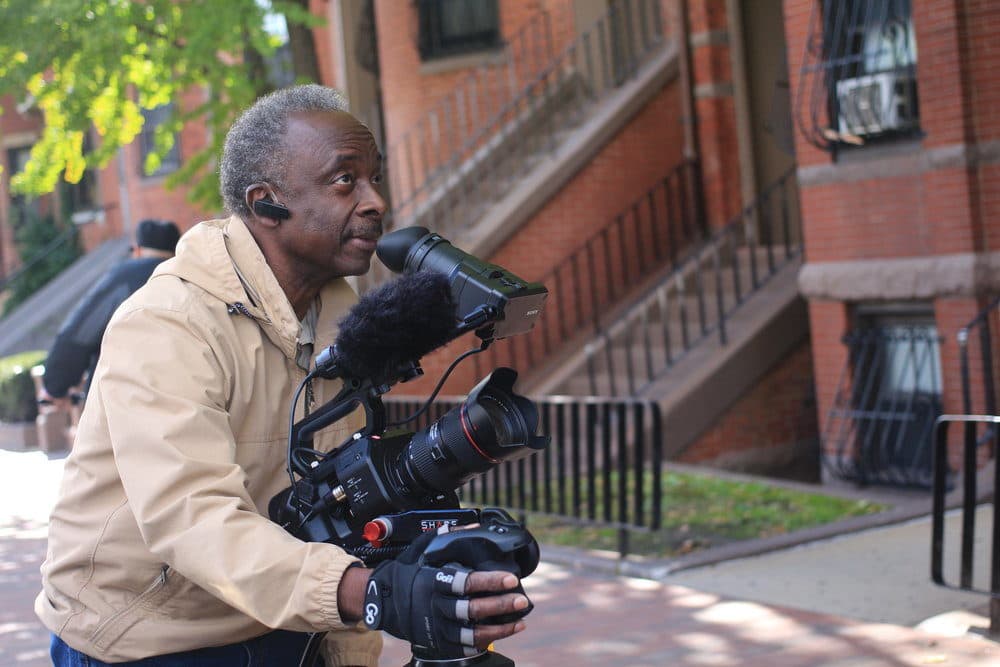Advertisement
Boston Filmmaker Roberto Mighty Wants To Show Martin Luther King And Coretta Scott King In All Their Complexity

Much more than a "kindly black man," Martin Luther King Jr. was considered dangerous by the FBI. He preached with a scholar’s authority on Christianity. He fell in love with and married an accomplished musician and driven civil rights advocate, Coretta Scott. Together, they marked a rise in the mid-century African-American intellectual scene that flourished in Boston.
Portraying the Kings in all their complexity is what Boston-based filmmaker and multimedia artist Roberto Mighty proposed for the documentary component of King Boston’s multi-venture effort to memorialize the couple’s work and time in the city. Mighty got word that he was chosen from six invited applicants for the commission last August. He has been devouring biographies and flying across the country to film interviews with those who knew the Kings ever since.
The 30-minute film, “Legacy of Love,” and additional online and interactive installation components will be part of the King Center for Civic Engagement and Economic Justice, currently planned to be housed at the Roxbury branch of the Boston Public Library. A world-class memorial for Boston Common, now narrowed to two finalists, as well as an endowment for King-related programming at Twelfth Baptist Church round off the initiatives on King Boston’s docket.

The anticipated deadline for Mighty’s film is June. His past work has spanned nonfiction to fiction — from documenting a year in the life of Boston’s decaying trees (“Trees of My City,” 2011) to adapting a friend’s poem into a narrative short film (“Peach Pie,” 2016). He deploys a wide range of formal approaches, too, from still photography (“Trees”), to moving images seen in theaters, online and at museums. For “Legacy of Love,” Mighty said he’ll combine historical biography with new interviews to tell — what else? — a love story.
“It’s just more fun!” said Mighty, who wants to take the Kings “off that pedestal” and make them relatable characters by recapping the beginning of their romance. The Kings fell in love in Boston while in graduate school in the early 1950s. Thousands of college-age people before and since have, too, said Mighty, who fondly recalls his own first significant romance as an undergraduate at Boston University.
From there the film will also include voices of current day religious leaders and elected officials who discuss what the Kings represent. And while Mighty has interviewed several “VIPs” as he called them, he wants more interviews with “regular people” who crossed their paths in Boston in the '50s or when they marched from Roxbury to Boston Common in 1965.
In one instance Mighty interviewed a 1951 Radcliffe graduate who briefly dated King. “She talks about becoming aware of Coretta … and it became obvious, ‘Oh yeah, this is how it’s going to go,’ ” he relayed. Mighty sought out the interviewee after reading about her in an archived Boston Globe article. “I will go anywhere to find people who can bear witness,” he said.
Several of Mighty’s past projects have dealt with the role of women, particularly unheralded women in history. When he served as Mount Auburn Cemetery’s inaugural artist in residence, he said he looked to feature women, people of color and LGBTQ people from the 19th century as the subjects for his online multimedia exhibit, “earth.sky.” He had a similar priority when filming people to read poems for the Favorite Poem Project, and online effort to encourage engagement with poetry, founded by Robert Pinsky.
That’s why Coretta Scott King will get equal treatment to her husband in “Legacy of Love,” he pointed out. (This also echoes King Boston’s effort to include her by changing its name from MLK Boston.) Coretta Scott was politically further left than King was when they first met. She also rose from picking cotton as a child to becoming a globally-revered civil rights leader. In “Legacy,” Mighty will bring to light the fact that she was “a real partner in the things they accomplished.”
“Legacy of Love” will also highlight Boston’s role in creating what Mighty called “the black intelligentsia” of the '50s and '60s. The Kings’ pursuit of social justice had an intellectual grounding which Mighty says often gets overlooked. “They are the kind of people who had faith, but Martin also had a scholarly understanding of the history of religion,” he said. “There is a pipeline of top black or African-American talent going to Boston during this time period because the colleges are admitting and graduating young people who go on to be great leaders,” he said.
Mighty felt the impact King had on academia personally as a Boston University student in the early 1970s.
“What strikes me, when I meet black people my age, we all sort of have this understanding of a debt that we owe to people who went before us,” he said. And while Mighty feels this duty in his own life, when it comes to the Kings, he sees something much bigger.
“America and the world owes a debt to the Kings’ vision. It transcends race and equal opportunity. I feel as strongly about that as I could feel about anything,” he said.
